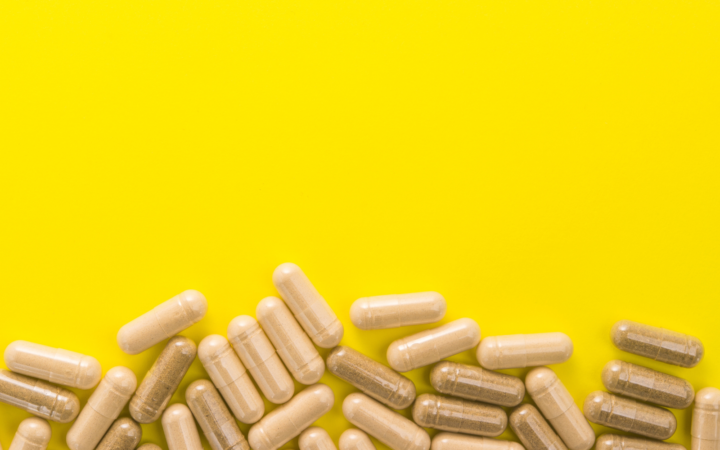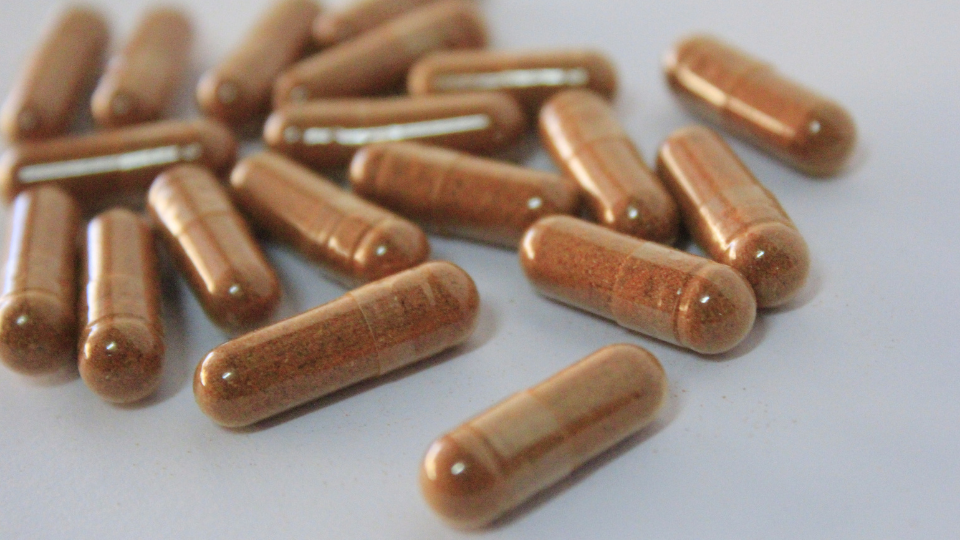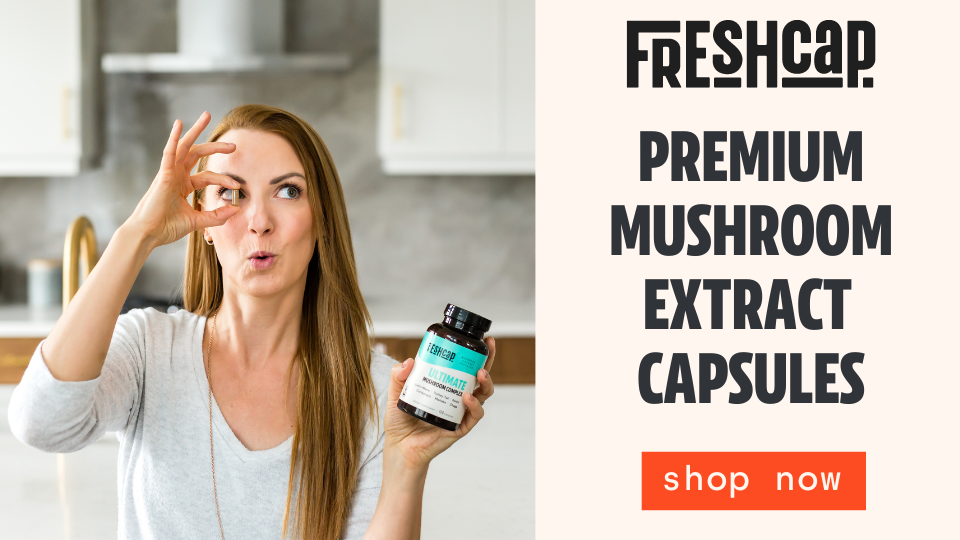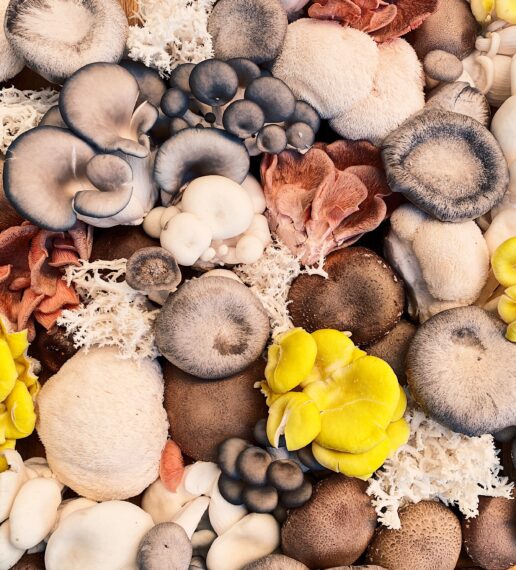Mushroom Capsules: What They Are, How They Help & How to DIY Your Own

If you’ve investigated consuming more mushrooms for good health, you’ve probably heard about medicinal mushroom extracts and powders.
Unlike many mushroom powders you’ll find in grocery stores, these capsules aren’t for adding flavor to food.
Sure, you could use your mushroom powders in plenty of delicious recipes.
But capsules are a convenient alternative- no mess, no fuss no prep- just mushroom power on-the-go!
Mushroom capsules (nope, not magic mushrooms) are a seamless way to reap all the amazing benefits of mushrooms.
What are Mushroom Capsules?
As you already know, some mushrooms are edible, some mushrooms are medicinal, and others might just kill you.
Of all edible mushrooms, some are great for tossing into a stir fry or side dish.
Shiitake, portobello, white button mushrooms, porcinis, and plenty of other varieties taste great so it’s easy to incorporate them into your meals.
Other mushrooms, however, have higher quantities of phytonutrients and antioxidants- but their flavor isn’t so appealing.
Reishi, turkey tail, chaga, and many others are known as functional or medicinal mushrooms due to their elevated levels of beta glucans and other important nutrients.
Instead of fresh, you can buy extracted versions of these medicinal mushrooms that are conveniently stuffed into capsules.
You could also buy fresh or dried mushroom powders and make the capsules yourself!
These mushrooms contain no psilocybin, so you won’t experience any hallucinogenic effects: just good health and immune-supporting potential.
With medicinal mushroom capsules, you can easily add beta glucans, potassium, B vitamins, and important antioxidants to your supplement routine.

What are Mushroom Capsules Made From?
Not all mushroom powders and capsules are the same.
If you are looking to actually get the benefits of mushrooms, you need to choose extracts made from the whole fruiting body.
Cheaper varieties are made from a different part of the mushroom called mycelium, which grows in rice grain- so the final product only contains trace amounts of the substances you want, and high levels of starch.
In high-quality mushroom powders, the raw mushrooms are carefully dried and extracted with hot water, then turned into a fine powder through a process called “spray drying”. The end result is a potent mushroom powder that contains all the beneficial compounds you’d expect in a mushroom supplement.
What About the Capsules Themselves?
Again, it depends on who you buy your mushroom capsules from.
Some brands will use cheap capsules made from any type of gelatin available — could be beef, pork, or vegetable-based.
Best bet is to look for products with capsules made from pullulan.
Pullulan is a substance made from fermented tapioca. It’s gluten-free, starch-free, and can be found in organic and non-GMO varieties.
Not only that, but pullulan is naturally vegan, halal, and kosher.
Pullulan also helps keep your mushroom extract safe from degrading under sunlight and oxygen.
Are Mushroom Capsules Organic? Vegan? Keto?
Now that you understand what goes inside mushroom capsules, what about specific dietary needs?
As for the capsules themselves, it depends on the manufacturer’s guidelines and what the capsules are made from.
Vegetarian capsules aren’t necessarily vegan or halal since it could have been made in a facility that processes pork products.
For the mushroom powders, again, it depends.
Look for organic seals of approval on mushroom products.
At FreshCap Mushrooms, for example, all mushroom products are made from the whole fruiting body, certified organic, vegan, non-GMO, gluten-free, and made from organic pullulan capsules.
Mushrooms are also an excellent ingredient for keto and paleo diets.
With extracts, you’ll consume concentrated versions of the mushroom- making your mushroom capsules super low-calorie and perfect for all diets.
Ingredients to Avoid
The best mushroom capsules are made from organic mushrooms and pullulan capsules.
Keep an eye out on ingredient lists to avoid fillers like brown rice, mushroom mycelium on grain, or wheat.
Some brands will also add what’s called a flow aid.
Have you ever tried to pour flour or cocoa powder into a cup? It doesn’t exactly flow, does it?
Some manufacturers add flow aids to improve the capsuling process. There isn’t anything inherently wrong with flow aids- but the extra ingredients are something to be aware of.
Basically, you don’t always know what you’re consuming with flow aids so it’s best to avoid them if you can.
Likewise, just because something is vegetarian, that doesn’t mean it’s healthy.
Bottom line- look for organic mushroom capsules that don’t contain any additional additives.
6 Types of Medicinal Mushrooms You Should Look for in Capsules
While all mushrooms are excellent for health and antioxidants, functional mushrooms have more bio-available polysaccharides and antioxidants for immune support.
1. Turkey Tail
Turkey tail is one of the most popular mushrooms for supporting the immune system.
Much of the research into mushroom anti-cancer properties have investigated the beta glucans of turkey tail and their effects.
2. Lion’s Mane
Lion’s mane mushroom is most commonly used for brain health- mental clarity, focus and memory.*
Lion’s mane may also help repair and defend against nerve damage.*
As a bonus, many people also claim that Lion’s Mane has a calming effect.* Lion’s mane is one of the few medicinal mushrooms that is also a delicious gourmet variety. So if you can find it fresh and like to cook, this mushroom deserves to be at the top of your list.
3. Chaga
Chaga doesn’t look like much of a mushroom- but don’t let it fool you.
Chaga is packed with anti-oxidants and other immune boosting properties.*
4. Cordyceps
A favorite fungi among athletes, cordyceps look much different than a traditional mushroom.
However, this funny looking mushroom may help boost stamina by improving how oxygen is delivered throughout the body.*
5. Maitake
Most of the research into maitake supports its ability to lower blood sugar levels, and bolster the immune system.*
Maitake is also an amazingly tasty gourmet mushroom- so it can be enjoyed in meals if you’d rather get your functional mushrooms that way.
6. Reishi
Reishi is a stunning mushroom most often used for promoting better sleep, protecting the immune system, and defending against heart disease.*
Reishi is tremendously bitter and has a woody texture. Needless to say, Reishi is best “enjoyed” in capsule form.
Whole Fruiting Body Vs. Mycelium on Grain: What’s the Difference?
If you are considering buying mushroom supplements, pay close attention to the actual ingredients.
Some manufacturers have a habit of using “mycelium on grain” rather than the whole fruiting body.
What does that mean?
Manufacturers grow the mycelium on pieces of grain- like brown rice, rye, oats, or other cereal grains.
Mycelium is the vegetative part of the mushroom that you wouldn’t even recognize as a mushroom or fungus if you saw it.
Instead, you want mushroom powders made from the whole fruiting body.
That’s the part of the mushroom that creates spores. It also holds more bio-available antioxidants and phytonutrients.
High-quality manufacturers will extract vital nutrients from the whole fruiting body with hot water, dry the powder, and encapsulate it.
Your body can’t break down certain pieces of the mushroom cell walls, so hot water extraction is necessary.
When companies stuff their products with mycelium on grain, not only are you getting fewer nutrients, but most of your product is brown rice filler.
Manufacturers don’t extract the mycelium from the grain, they grind all of it up together and capsule it.
Mycelium can go by many names including cultured oats, freeze-dried brown rice, or mycelial biomass.
Bottom line- you want mushroom extracts that are actually made from mushrooms- so be sure to read the ingredients!
How to Make Your Own Mushroom Capsules
If you’re a DIY-er, you can buy organic mushroom powders made from the whole fruiting body, a package of capsules, capsule machine, and make your own.
You can also buy fresh or dried mushrooms and toss them into a coffee grinder to make your own powder.
While it’s easy to make your own capsules, it’s also super time-consuming.
You have to
- Separate your capsules (top and bottom)
- Fill each side of the capsule maker
- Add your mushroom powder
- Spread evenly into the capsules
- Use a device to pack the capsules
- Add more mushroom powder and spread again
- Pack the capsules again and continue until they’re full
- Put your finished capsules away and clean up
Don’t have time to do this every week? No problem.
FreshCap Mushrooms offers premade capsules filled with our Thrive 6 special blend of all six medicinal mushrooms mentioned here along with pullulan capsules.
Mushroom Capsule Dosing Guidelines
Most people consume between one half and two grams of mushroom powder extract each day.
In practice, this amounts to one to four capsules.
However, your dosage really depends on your personal health needs and any medical condition you wish to treat.
As always, you should contact a healthcare professional to discuss how much mushroom powder you should take each day, and which species might be best.
The Bottom Line
Think of mushrooms like nature’s multi-vitamin.
While it’s easy to add more mushrooms to your diet, it’s even easier to reach for a bottle of mushroom capsules made from organic mushroom powders.



hey , Tony
thank you very much for this informative post , really enjoyed reading it.
and i have a question ,
i would like to make capsules with few different powders .
so if you wrote that each capsule is approximately 0.5 gram .
so can i divide the powders to equal amounts mix it and put it in the capsules ??
thanks in advanced 🙂
Hey there! Sure that should definitely work 🙂 Keep in ming, that 0.5 gram per capsule will depend on capsule size and the density of the powders you mix in 🙂
1) Thank you so much for the information always. It is much appreciated. 2) All the research I’ve read, (as an ethnobotany student) states that mycelium is far more potent than the fruiting body, but here it states that the good powders are made from the thallus. I would love to hear your logic. Thank you!